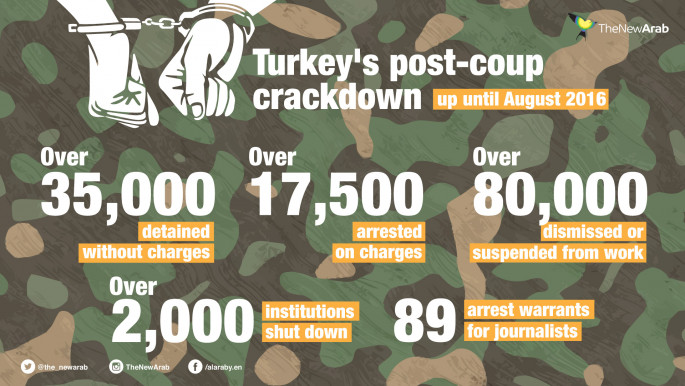Turkey's state of emergency facilitates torture, says HRW
"By removing safeguards against torture, the Turkish government effectively wrote a blank cheque to law enforcement agencies to torture and mistreat detainees as they like," Hugh Williamson, HRW's Europe and Central Asia director, said in a statement.
"The cases we have documented seem to indicate that some have done just that. Turkey's government should reinstate these crucial safeguards now."
In a report titled "A Blank Check: Turkey's Post-Coup Suspension of Safeguards Against Torture", the US-based watchdog cited 13 cases of alleged abuse, including torture, sleep deprivation, severe beatings, sexual abuse and rape threats among people arrested after the 15 July attempted putsch.
It detailed several examples of detainees with bruises and marks on their body and said some lawyers were too scared to record evidence that their clients had been tortured.
"There was not a part of (a detainee's) body that was not covered in bruises,” a forensic specialist told HRW.
In one alleged incident, an Istanbul-based lawyer told the rights group that her client said officers "threatened to rape them and their wives".
In another incident, a person who was detained described in a statement to a prosecutor how he was tortured in detention.
 |
By removing safeguards against torture, the Turkish government effectively wrote a blank cheque to law enforcement agencies to torture and mistreat detainees as they like. - Hugh Williamson |
 |
"The police chief who detained me... began to slap me in the face and eyes," he said.
"They beat me on the soles of my feet, on my stomach, then squeezed my testicles, saying things like they'd castrate me."
The 43-page report is based on interviews with 40 people between August and September including lawyers, human rights activists and those who had been detained, HRW said.
The emergency was first imposed a few days after the coup bid then extended for another 12 weeks earlier this month.
It extended detention without judicial review from four to 30 days, and authorised a detainee to be denied access to a lawyer for up to five days, HRW said.
The group also said the authorities restricted access to attorneys, and often only allowed legal aid lawyers to those arrested.
Official denial
The Turkish government did not immediately respond to requests for comment.
However, two days before the report was published, Justice Minister Bekir Bozdag insisted "there is no bad treatment or torture" in Turkish prisons and detention centres.
In a series of Twitter posts on Sunday, Bozdag demanded those making such accusations provided further details on where and when the abuse took place, who the victims were and who the perpetrators were.
He did not name the HRW or any other group as the accuser.
"They do not give information or a chance for Turkey to investigate; they do not accept Turkey's explanations, they only blame Turkey," he said in one tweet.
In another, he said Turkish prisons and detention centres were open to international, civil, judicial and administrative checks.
"These checks have been made completely," he added.
'Abhorrent practices'
This was not the first time Turkish police were accused of torturing detainees arrested in the post-coup purge.
In July, shortly after the failed coup attempt, human rights group Amnesty International said that some of those being held were being "subjected to beatings and torture, including rape, in official and unofficial detention centres in the country".
"Reports of abuse including beatings and rape in detention are extremely alarming, especially given the scale of detentions that we have seen in the past week," said John Dalhuisen, Amnesty International's Europe director.
"The grim details that we have documented are just a snapshot of the abuses that might be happening in places of detention," he added.
"It is absolutely imperative that Turkish authorities halt these abhorrent practices and allow international monitors to visit all these detainees in the places they are being held."
Dalhuisen added that the Turkish government has remained silent, despite the images and videos of the abuse being widely broadcast across the country.
More than 35,000 people have been placed under arrest since a rogue military faction tried to remove President Recep Tayyip Erdogan from power.
The Turkish government argues it is dealing with an extraordinary threat to the country, but its allies in the West have expressed concern and urged it to act in line with the rule of law.
 |
| [Click to enlarge] |
Agencies contributed to this report.
![Turkish police [AFP] Turkish police [AFP]](/sites/default/files/styles/large_16_9/public/media/images/F2E6DE08-E85E-47D3-8E1E-F4DCEA7CB2FD.jpg?h=d1cb525d&itok=7le3irKA)


